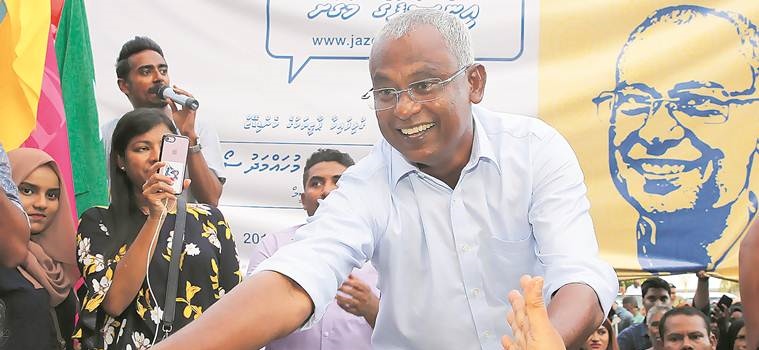India Wins in Maldives Election
September 29, 2018 | Expert Insights

A stunning and overwhelming victory of the Maldives presidency by Solih puts India in a better position in the region and improves overall relations at a time when Beijing was making significant intrusions.
Background
The Maldives is an Islamic republic which lies off the Indian sub-continent. It is made up of a chain of nearly 1,200 islands, most of them uninhabited. The tiny region can be described as a mixed economy which is based on the principal activities of tourism, fishing and shipping. Development of the infrastructure in the Maldives is mainly dependent on the tourism industry and its complementary tertiary sectors, transport, distribution, real estate, construction, and government.
The first multi-party elections held in the Maldives took place in 2008, following a 30-year rule by Maumoon Gayoom. Mohamed Nasheed was the first democratically elected President of the country. Protests broke out in 2011 over the administration’s inability to operate effectively. After an escalation of protests in February 2012, Nasheed resigned. He later said that he was forced to resign with a “gun held to his head” in a coup.
Nasheed was succeeded by Abdulla Yameen after a highly contested election in November 2013.
In 2015, Nasheed was convicted on charges of terrorism and sentenced to 13 years in prison.
In February 2018, the Yameen government declared a 15-day state of emergency. Soon after, security forces stormed the Supreme Court. The Supreme Court judge, chief justice and chief judicial administrator were arrested, as well as Gayoom, now a member of the opposition who had expressed support for the ruling. Mohamed Nasheed, in a Twitter post, said Yameen has "overrun the judiciary and legislature, arrested hundreds unlawfully and introduced a "new normal" in the Maldives - full dictatorship".
The President of the Maldives is elected using the two-round system; if there are more than two candidates, and no candidate receives a majority of the vote in the first round, a second round will be held. The recent Presidential elections were held on 23 September 2018. Incumbent President Abdulla Yameen ran for re-election. In June 2018 the Maldivian Democratic party selected Ibrahim Mohamed Solih as its candidate after Nasheed withdrew his candidacy.
Read more of our extensive analysis of the political crisis in the Maldives here and here.
Analysis
Voters in the Maldives have thrown out the incumbent president, Abdulla Yameen, in an extraordinary rebuke to a leader who jailed political opponents and judges and drew his country closer to China during a tumultuous five-year term. With more than 80% of the ballots counted on Sunday night, Ibrahim Mohamed Solih, popularly known as Ibu, was ahead by an unassailable 17 points in an election viewed as a referendum on democracy in the Indian Ocean archipelago.
This a strategic win for Delhi because of President Solih’s attitude towards India. Under former President Yameen, China was able to exert significant influence, drawing the country politically closer to itself and further away from India. President Solih has publicly declared India to be an ally, making India’s strategy of patience a smart one. When President Yameen called a state of emergency and implemented an authoritarian regime In February, India was under pressure to use military intervention in the Maldives. However, by taking the long view and allowing the country to elect a democratic leader, India has emerged victorious.
The Maldives is a strategic ally for India given its proximity to shipping cargo sea-lanes and navy bases. President Yameen’s inclination towards a relationship with China put India’s position in the Indian Ocean in jeopardy. While India has regained its footing with President Solih’s win, China will not be completely retreating. Chinese State Media has indicated that Beijing intends to partner with India in the Maldives, to maintain regional harmony. However, this initiative has yet to be officially approved by the Chinese government, raising questions about future Indo-China relations in the region.
Assessment
Our assessment is that India needs to reassert its presence in the Maldives region, especially since China has no intention of departing. We feel that taking advantage of the strong relationship with the new president will be essential for maintaining its security concerns.








Comments